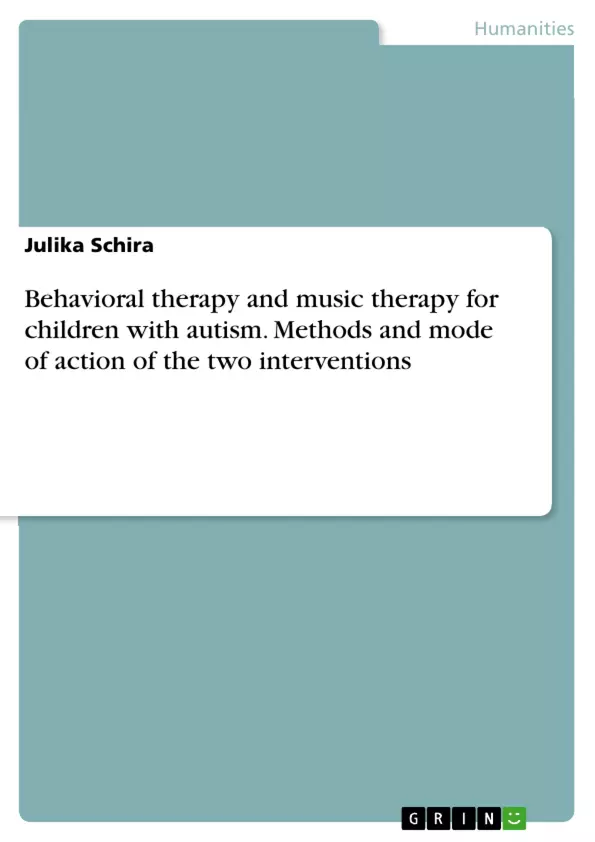Autism is one of the most serious mental illnesses in children. A cure is not yet possible. But there are special therapies that relieve the symptoms and enable those affected to lead a self-determined life.
Social work can thus provide lasting support for autistic people in their development. In which areas can therapy help? And which therapies are particularly promising? Julika Schira presents behavioral and music therapy in her publication.
Her book provides a well-founded overview of the different forms of autism and their symptoms. Building on this, Schira explains the basics and methods of behavioral and music therapy. She weighs the advantages and disadvantages of the two approaches against each other and thus supports those affected in the decision for or against therapy.
From the content:
- Behavioral therapy;
- Intervention;
- Autism Spectrum Disorder;
- Developmental disorder;
- Disturbance of perception;
- Psychiatry
Table of Contents
- Introduction
- Autistic disorders
- History of the term "autism" - an overview
- Classification according to ICD-10 and DSM-V
- Forms of autistic disorders and their symptomatology
- Autistic disorders and intelligence
- Root cause research and the development of interventions
- Behavioral therapy interventions for autistic disorders
- Basics of Behavioral Therapy
- Four selected methods of behavioral therapy
- Interim conclusion
- Music therapy interventions for autistic disorders
- Basics of Music Therapy
- Four selected principles of music therapy
- Interim conclusion
- Comparison of behavioral therapy and music therapy
- Similarities
- Differences
- Discussion and outlook
Objectives and Key Themes
The primary objective of this work is to explore and compare two therapeutic approaches, behavioral therapy and music therapy, in the context of treating children with autistic disorders. It delves into the theoretical underpinnings, specific methodologies, and potential benefits of each intervention.
- The history and evolution of the term "autism" and its classification
- The different forms of autistic disorders and their associated symptoms
- The role of behavioral therapy in addressing the challenges of autistic children
- The application of music therapy principles in supporting the development of autistic individuals
- A comparative analysis of the similarities and differences between behavioral therapy and music therapy
Chapter Summaries
- Introduction: This chapter establishes the relevance of autism spectrum disorder, highlighting the growing body of research and evidence-based therapeutic approaches. It outlines the scope of the work, focusing on the treatment of autistic children, and emphasizes the need for early interventions.
- Autistic disorders: This chapter provides a comprehensive overview of autism spectrum disorder, encompassing its history, classification according to ICD-10 and DSM-V, various forms and associated symptomatology, the relationship between autism and intelligence, and ongoing research into its root causes.
- Behavioral therapy interventions for autistic disorders: This chapter delves into the principles and methods of behavioral therapy, highlighting its effectiveness in treating autistic disorders. It focuses on four specific behavioral therapy methods, providing insights into their application and potential benefits.
- Music therapy interventions for autistic disorders: This chapter explores the fundamentals of music therapy, outlining its theoretical basis and its unique potential in supporting autistic individuals. It examines four selected principles of music therapy, illustrating their application in therapeutic settings.
- Comparison of behavioral therapy and music therapy: This chapter analyzes the similarities and differences between behavioral therapy and music therapy in terms of their theoretical underpinnings, methodologies, and potential outcomes.
Keywords
The primary keywords and focus topics of this work include autism spectrum disorder (ASD), behavioral therapy, music therapy, evidence-based interventions, child development, social interaction, communication, repetitive behaviors, ICD-10, DSM-V, and therapeutic approaches.
Frequently Asked Questions
What are the main symptoms of Autism Spectrum Disorder (ASD)?
ASD is characterized by challenges in social interaction, communication difficulties, and repetitive or restricted patterns of behavior and interests.
How does behavioral therapy help children with autism?
Behavioral therapy focuses on teaching new skills and reducing problematic behaviors through structured interventions and positive reinforcement.
What is the role of music therapy in autism treatment?
Music therapy uses musical interaction to support emotional expression, social communication, and sensory integration, often reaching children who struggle with verbal communication.
What is the difference between ICD-10 and DSM-V classifications?
These are diagnostic manuals used by professionals. While ICD-10 (WHO) is used globally, DSM-V (APA) introduced the umbrella term "Autism Spectrum Disorder," merging previously separate diagnoses like Asperger's.
Can autism be cured?
Currently, there is no cure for autism. However, early interventions and specialized therapies can significantly improve symptoms and help individuals lead self-determined lives.
- Quote paper
- Julika Schira (Author), 2019, Behavioral therapy and music therapy for children with autism. Methods and mode of action of the two interventions, Munich, GRIN Verlag, https://www.grin.com/document/1181613



